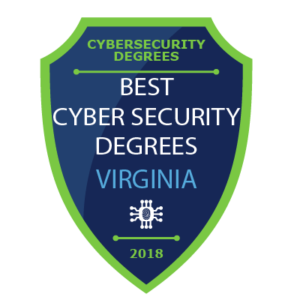Information Assurance and Cyber Security Degrees in Virginia
Myriad cyber security opportunities are available in Virginia, thanks in large part to the state’s economy. With a GDP of nearly $500 billion, Virginia is a leader in information services and technology, and contains a large percentage of government employees because of its proximity to Washington, D.C. The state is also a major player in cyber security education, with nearly twenty colleges and universities offering IS programs, half of which are CAE-designated by the NSA and DHS.
Cyber Security Jobs in Virginia
Virginia ranks first in the country for both population (11,550) and concentration of information security analysts, according to the Bureau of Labor Statistics. Virginia IS workers also earn $10k more than the national average of $93k, and senior-level positions command premier salaries. As previously mentioned, the majority of jobs are government-related in Northern Virginia. The largest hub is Arlington, home to twenty federal agencies including the Department of Defense, Bureau of Diplomatic Security, Defense Information Systems Agency, and Transportation Security Administration. From there, Herndon, McLean, Reston, and Chantilly are the next-to-largest talent magnets; and beyond government agencies, prominent cyber defense and security contractors include Booz Allen Hamilton, General Dynamics Information Technology, ManTech International Corporation, CACI, and Leidos. Still, not all Virginia jobs are defense-oriented. Healthcare, financial services, and other industries are excellent job sources for security professionals interested in the private sector.
Cyber Security Degrees in Virginia
A dozen schools offer certificates in cyber security, including Old Dominion University, Radford University, Virginia Tech (which also offers a minor), University of Virginia, and University of Richmond, among others.
Strayer University, Regent University, Marymount University, and ECPI University offer bachelor’s degrees in Cyber Security, including specializations in Digital Forensics and Network Security.
For those interested in advanced programs, eight schools offer master’s tracks in cyber security specializations: George Mason University, Liberty University, Virginia Commonwealth University, James Madison University, Hampton University, Marymount University, Strayer University, and University of Fairfax. Fairfax also has a unique Doctorate in Information Assurance, one of the few of its kind in the country.
The 5 Best Cyber Security Degree Providers in Virginia

Perhaps unsurprisingly, there are many high quality cyber security (and related field) degree providers in the state of Virginia. We’ve taken a look at all cyber security degree providers in the state (and you can too in our directory below) and pulled out the top programs based on our detailed ranking methodology. Factors in the ranking of a school include whether they are an NSA Center of Academic Excellence, the range of cyber security-related degrees offered, and a wide range of metrics checking out academic quality, affordability, return on investment, and student satisfaction. For a detailed rundown of our ranking methodology as well as national cyber security degree rankings, check out our rankings page.
1) Norfolk State University

NSU is a public, historically black university based out of Norfolk, Virginia. It conveys undergraduate, graduate and doctoral degrees through schools of Business, Education, Liberal Arts, Engineering, Science & Technology, Social Work, Extended Learning, Honors and its Graduate school. It’s known for its programming in Electronic Engineering, Computer Science, Criminal Justice and much more. It also offers the only bachelor’s degree in Optical Engineering in the state. There are over 5,400 students at Norfolk, which has a 17:1 student-to-faculty ratio.
NSU offers a Bachelor of Science and a Master of Science with Information Assurance Emphases, and a Master of Science in Cybersecurity. The Bachelor’s program is a blend of theoretical and practical concepts, including lab work that builds hands-on skills in the discipline. It requires 120 credits. Its Master’s version builds analytic skills, offers stimulating research work, and builds professional development opportunities in computer science. It can be completed in 1 1/2 to two years. The M.S. in Cybersecurity requires 36 credits, culminating in a 6 credit Capstone. Sample courses include Secure Operating Systems, Management of Information Security, Computer Security and more. NSU has been named a National Center of Academic Excellence in Information Assurance Education by the NSA and DHS.
- Homepage
- Average Net Price Undergrad: 5th-$15,103
Online Cybersecurity Degree Programs:
- None
2) Hampton University

HU is a private, historically black university based in Hampton, Virginia. It was founded in 1868 during Reconstruction after the Civil War to provide freedmen with higher education options. The university has wide selection of online programs with great support for distance learners. Over 4,600 students attend Hampton, which has an 11:1 student-to-faculty ratio. Hampton offers 50 baccalaureate programs, 26 master’s programs, 7 doctoral programs, 2 professional programs, and 10 associate/certificate programs. It’s the first and only HBCU to have 100% control of a NASA mission.
HU offers a Master of Science degree in Information Assurance. In it, through broad, multidisciplinary study, students will learn to, “defend, protect, design, implement and maintain secure information and information systems.” Sample courses include Wireless Networks, Network Security and Intrusion Detection, and Risk Management. This program was designed for students with significant computer science experience. For students who are interested in it but don’t have that background, HU offers a Bridge Program that prepares students for the degree. HU has been labeled a National Center of Academic Excellence in Information Assurance Education by the NSA and DHS.
- Homepage
- Average Net Price Undergrad: 15th-$24,377
Online Cybersecurity Degree Programs:
- None
3) Marymount University

Marymount is a private, Catholic university based out of Arlington, Virginia. It was founded in 1950. Over 3,300 students attend the school, which offers a 13:1 student-to-faculty ratio. Marymount offers Bachelor’s, Master’s and Doctoral degrees, among other programs in teaching, law, medicine and physical therapy through schools of Arts and Sciences, Business Administration, Education and Human Services, and Health Professions. It has been distinguished by U.S. News & World Report for quality, diversity, and the strength of its Master’s programs.
Marymount offers a wealth of cybersecurity programs. They include a Bachelor of Science in Information Technology with a specialty in Networking and Cybersecurity, a Computer Security and Information Assurance Graduate Certificate. a Cybersecurity (M.S.), a Cybersecurity Certificate, a Master of Science in Information Technology with a concentration in Computer Security, and a D.Sc doctoral program in cybersecurity to boot. Marymount has been designated a National Center of Academic Excellence in Information Assurance Education by the NSA and DHS.
- Homepage
- Average Net Price Undergrad: 16th-$24,719
Online Cybersecurity Degree Programs:
- None
4) Virginia Tech

Virginia Tech is a public research university headquartered in Blacksburg, Virginia. It was founded in 1872. Over 33,000 students attend the school, enjoying a 14:1 student-to-faculty ratio. VT offers Associate’s, Bachelor’s, Master’s and Doctoral degrees, in addition to Post-Baccalaureate and Post-Master’s certificates. Virginia Tech is the third largest school in the state. In 2016, USNR ranked Virginia Tech 70th among national universities and tied for 26th among public universities. Its electrical and computer engineering was ranked 15th in the nation as well. It has also been named a National Center of Academic Excellence in Information Assurance Education by the NSA and DHS.
Virginia Tech offers a graduate certificate, an undergraduate minor and a Master degree in cybersecurity. Its Information Technology program has been ranked second by USNR among “Best Online Graduate Computer Information Technology Programs.” Currently the Master’s of Information Technology program offers a Security focus, but will be adding Cybersecurity Management and Cybersecurity Policy concentrations soon. The Cybersecurity undergraduate minor covers information security, network security, and computer system security. VT’s Graduate Certificate in Information Assurance Engineering is made up of four courses: Fundamentals of Information Security, Network Architecture and Protocols (I and II), and Software Engineering. Virginia Tech’s information technology programs are frequently updated to reflect new technological developments and trends.
- Homepage
- Average Net Price Undergrad: 9th-$17,190
Online Cybersecurity Degree Programs:
- Masters of Information Technology
5) George Mason University

GMU was founded in 1949. It’s the largest public research university in Virginia. The school is known for its business, economics, law, creative writing and computer science programs, which have all been recognized as top research programs by the Carnegie Classification of Institutions of Higher Education. It has consistently been highly ranked both nationally and globally by the Academic Ranking of World Universities, Forbes, and USNR. Mason boasts a 16:1 student to faculty ratio, and serves over 34,900 students.
Applied Cyber Security Graduate Certificate, a B.A.S. with a concentration in Cybersecurity, a certificate Program in Telecommunications, Forensics, and Security, an M.S. in Computer Forensics, a Masters in Information Security and Assurance, an M.S. in Computer Engineering with a concentration in Network and System Security, an MS in Computer Forensics, and an M.S. in Management of Secure Information Systems. There are also several related graduate programs that can be taken as hybrid courses. George Mason’s online programs offer classes 100% online, but may require students to attend campus for orientation, tests, final exams, or labs.
- Homepage
- Average Net Price Undergrad: 11th-$18,032
Online Cybersecurity Degree Programs:
- Some programs are partially online.
Cyber Security Resources in Virginia
State Government Entity/Resource
State Government Entity/Resource
Professsional Association
Professsional Association
Professsional Association
Professsional Association
Meetup
Meetup
Other Resource: FBI/private partnership
Other Resource: FBI/private partnership
Other Resource: Conference
Other Resource: Veterans training program
Other Resouece: Innovation center and incubator
Center for Innocative Technology
Other Resource: Tech business development center
Other Resource: Conference
Medical Device Cybersecurity Risk Mitigation Conference
Other Resource: Conference
Cyber Security Degree Providers in Virginia
Below we’ve included some of the most pertinent information for choosing a cyber security degree program. Affordability looked at the average in-state tuition rate (where applicable) and divided the range of tuition rates into five bins. Each bin contains a roughly $8,000 jump in tuition. So one $ contains schools from roughly $1,000 in in-state tuition to $9,000, $$’s contains schools from >$9,000 to $17,000, and so forth. Retention rate is one of the best predictors of undergraduate education quality. While the NSA/CAE designation marks programs deemed excellent by the NSA.
ECPI University
84%
47%
No
Degrees
- Associate of Science in Computer and Information Science – Cyber and Network Security Concentration Bachelor of Science in Computer and Information Science – Cyber and Network Security Major
George Mason University
73%
87%
Yes
Degrees
- Applied Cyber Security Graduate Certificate BAS Concentration in Cybersecurity Certificate Program in Telecommunications Forensics and Security M.S. in Computer Forensics Masters in Information Security and Assurance MS in Computer Engineering – Network and System Security MS in Computer Forensics MS in Management of Secure Information Systems
Hampton University
96%
81%
Yes
Degrees
- Master of Science degree in Information Assurance
James Madison University
62%
91%
Yes
Degrees
- Certificate in Network/Information Security Certificate in Secure Computer and Database Systems Master of Science in Computer Science: Digital Forensics Master of Science in Computer Science: Information Security
Liberty University
96%
83%
No
Degrees
- Master of Science in Cyber Security Master of Science in Information Systems – Information Assurance
Lord Fairfax Community College
64%
66%
Yes
Degrees
- Associate of Applied Science in Cybersecurity Cybersecurity Career Studies Certificate
Marymount University
95%
79%
Yes
Degrees
- Bachelor of Science in Information Technology – Specialty in Networking and Cybersecurity Computer Security and Information Assurance Graduate Certificate Cybersecurity (M.S.) Cybersecurity Certificate Master of Science in Information Technology – Concentration in Computer Security
Norfolk State University
100%
77%
Yes
Degrees
- BS in Computer Science – Information Assurance Emphasis MS Cybersecurity MS in Computer Science – Information Assurance Emphasis
Northern Virginia Community College
57%
73%
Yes
Degrees
- Associate of Applied Science in Cybersecurity Cybersecurity Career Studies Certificate
Old Dominion University
90%
78%
No
Degrees
- Cyber Security Certificate
Radford University
79%
74%
No
Degrees
- Undergraduate Certificate in Information Security
Regent University
99%
78%
No
Degrees
- Bachelor of Science in Cybersecurity
Strayer University
46%
54%
No
Degrees
- Bachelor of Science in Information Technology – Cyber Security Technology Bachelor of Science in Information Technology – Digital Forensics Technology Master of Science in Information Assurance Master of Science in Information Systems: Computer Forensic Management Master of Science in Information Technology – Computer Forensic Management
Tidewater Community College
72%
60%
No
Degrees
- Associate of Applied Science in Information Systems Technology – Cyber Security Concentration Career Studies Certificate in Cyber Security
University of Fairfax
N/A%
N/A%
No
Degrees
- Cybersecurity Best Practices (CBP) – CISSP Graduate Certificate Doctor of Science in Information Assurance (DSc) Doctorate in Information Assurance (DIA) Information Security Professional Practices (ISPP) Graduate Certificate Master of Science in Information Security Management (MSISM)
University of Richmond
63%
93%
No
Degrees
- Certificate in Information Security
University of Virginia
56%
96%
No
Degrees
- Certificate in Cybersecurity Management
Virginia Commonwealth University
82%
86%
No
Degrees
- Master of Science in Computer and Information Systems Security
Virginia Tech
64%
93%
Yes
Degrees
- Graduate Certificate in Information Assurance Undergraduate Minor in Cybersecurity
